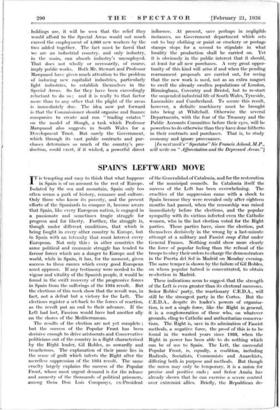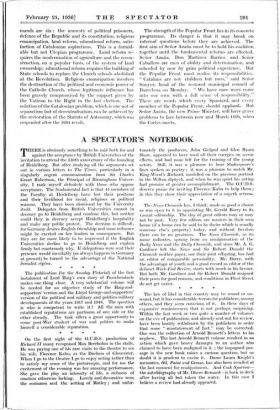SPAIN'S LEFTWARD MOVE
-IT is tempting and easy to think that what- appens in Spain is of no account to the rest of Europe. Isolated by the sea and mountain, Spain only too often seems a park of history, romance and culture. Only those who know its poverty, and the present efforts of the Spaniards to conquer it, become aware that Spain, like every European nation, is engaged in a passionate and sometimes tragic struggle for progress and for liberty. Further, the struggle is, though under different conditions, that which is being fought in every other country in Europe, but in Spain with an intensity that must interest every European. Not only this : in other countries the same political and economic struggle has tended to favour forces which are a danger to Europe and the world, while in Spain, it has, for the moment, given success to these- causes which every good European must approve. If any testimony were needed to the vigour and vitality of the Spanish people, it would be found in the swift recovery of the progressive forces in Spain from the sufferings of the 1934 revolt. But the elections of this week show that the revolt was, in fact, not a defeat but a victory for the Left. The elections register a set-back to the forces of reaction, as the revolt put an end to their advance. If the Left had lost, Fascism would have had another ally on the shores of the Mediterranean.
The results of the election are not yet complete ; but the success of . the Popular Front has been decisive enough to drive aristocrats and Conservative politicians out of the country in a flight characterised by the Right leader, Gil Robles, as cowardly and treacherous. The explanation of their panic lies in the sense of guilt which infects the Right after the merciless suppression of the 1934 revolt. The same cruelty largely explains the success of the Popular Front, whose most urgent demand is for .the release and amnesty of the thousands of political prisoners,- among them Don Luis Companys, ex-President of the Generalidad of Catalonia, and for the restoration of the municipal councils. In Catalonia itself the success of the Left has been overwhelming. The cruelties of the suppression came with a shock to Spain because they were revealed only after eighteen months had passed, when the censorship was raised immediately before the elections, and the popular sympathy with its victims infected even the Catholic women, who in the last election voted for the Right parties. Those parties have, since the election, put themselves decisively in the wrong by a last-minute attempt at a military and Fascist coup d'etat under General Franco. Nothing could show more clearly the force of popular feeling than the refusal of the troops to obey their orders to charge the demonstrators in the Puerta del Sol- in Madrid on Monday evening.
The same temper is shown by the failure of Gil Robles, on whom popular hatred is concentrated, to obtain re-election in Madrid.
These indications seem to suggest that the strength of the Left is even greater than its electoral successes.
Senor Robles' party, the reactionary C.E.D.A., will still be the strongest party in the Cortes. But the C.E.D.A., despite its leader's powers of organisa- tion, is not a single force, like.the Right in general, it is a conglomeration of those who, on whatever- grounds, cling to Catholic and authoritarian conserva- tism. The Right is, save in its admiration of Fascist methods, a negative force, the proof of this is to be found in the wasted years since 1933, when the Right in power has been able to do nothing which can be of use to Spain. The Left, the -successful Popular Front, is,. equally, a coalition, including Radicals, Socialists, Communists and Anarchists, differing both in purpose and methods. But though the union may only be temporary, it is a union for precise and positive' ends ; and Seiior Azaiia has already shown that he can exercise a severe control over extremist -allies. Briefly, the Republican dc- minds are six : the amnesty of political prisoners, defence of the Republic and its constitution, religious emancipation, land reform, educational reform, satis- faction of Catalonian aspirations. This is a formid- able but not Utopian - programme. -Land reform re- quires the modernisation of agriculture and the recon- struction, on a popular basis, of the system of land ownership; educational reform requires the building of State schools to replace the Church schools abolished at the Revolution. Religious emancipation involves the destruction of the political and economic power of the Catholic Church, whose legitimate influence has been gravely compromised by the support given by the Vatican to the Right in the last election. The solution of the- Catalonian problem, which is one not of separatism but of decentralisation, can be achieved by the restoration of the Statute of Autonomy, which was suspended after the 1934 revolt. The strength of the Popular Front lies in its concrete programme. Its danger is that it may _ break on internal questions before they are achieved. The first aim of Senor Azaiia must be to hold his coalition together until the fundamental reforms are effected. Senor Azaiia, Don Martinez Barrios and . Seiior Caballero are men of ability and determination, and schooled by now by grim political experience. But the Popular Front must realise its responsibilities. " Catalans are not children but men," said Senor Sunyer, head of the restored municipal council of Barcelona on Monday. " We have once more come into our own with a full sense of responsibility." These are words which every Spaniard, and every member of the Popular Front, should applaud.. But Senor Azafia, the new Prime Minister, will have grave problems to face between now and March 16th, when the Cortes meets.















































 Previous page
Previous page